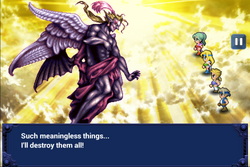Template:Sideicon

Kefka's motive.
Nihilism is a recurring character motivation in the Final Fantasy series, driving the character to believe nothing truly matters. It is utilized by many villains in the series to justify their actions. In some cases, the heroes will refute the antagonists' motives with their own experiences.
Nihilism is the philosophical doctrine suggesting the negation of one or more putatively meaningful aspects of life.
Individual examples
Final Fantasy III
Xande, due to being given the gift of mortality by Noah, ended up becoming nihilistic due to thinking life had no meaning in general, and ultimately used that as his motive for covering the world in darkness and freezing time to stave off death.
Final Fantasy V
Exdeath, shortly after being accidentally sucked into the Void during his final confrontation with the Warriors of Light, devolved into nihilism upon turning into Neo Exdeath, proclaiming to continue to destroy until there is nothing left to destroy, and only then would he cease to exist.
Final Fantasy VI
Kefka Palazzo, when confronting the Returners atop his tower, informs them of his motives of destruction by stating that life and creation are meaningless. When the Returners refute his claims by citing personal examples of finding positives in the ruined world, Kefka goes berserk and rages that he'll destroy everything. He reiterates his nihilistic beliefs when confronting the party in his God of Magic form.
Final Fantasy IX
After observing Kuja's actions, Necron comes to a conclusion that all life seeks death which he plans to deliver by destroying the Crystal, origin of the life.
Final Fantasy X
Seymour Guado demonstrates through many of his actions and words that he holds extreme nihilistic views on life. Due to his parentage, he became an outcast among both humans and Guado. Exiled with his mother by his father Jyscal Guado, Seymour was forced to see his mother choose to become an aeon to give him the power to defeat Sin, hoping that this would lead to his acceptance. Through his prolonged exile, bereavements and knowledge of Sin's seemingly perpetual rebirth, Seymour eventually saw life as a meaningless period of pain and suffering: he believed that death was a release from that suffering, and uses that to justify many of his actions, including the murder of Maester Wen Kinoc and the slaughter of the Ronso. Dissidia Final Fantasy Opera Omnia alludes to this by having Seymour Guado's Manikin named "Ephemeral Nihilist".
Final Fantasy XIII
Although not directly referred to as such, Barthandelus is labeled as nihilistic in his motivations in the description for the "Fighting Fate" DLC in Theatrhythm Final Fantasy. Orphan, on the other hand is defined to be nihilistic in its outlook on life and desire to die for its fellow fal'Cies' case.
Final Fantasy XIII-2
Caius Ballad's plan was to free Yeul from the curse Etro gave her which would lead to her death and perpetual reincarnation by destroying the timeline. Yeul had been killed and reborn countless times under Caius's watch which causes him to desire the death of the Goddess who crafted Yeul's fate. The death of Etro would mean there would be nothing holding the Chaos at bay from the Unseen Realm which would directly lead to the destruction of the Visible Realm and time itself. It is clear from Caius's actions that he loves Yeul as his charge, and wishes to free her of her burden, even if it means sacrificing himself to achieve his goal. Having to witness every incarnation of Yeul die while he is forever unable to leads him to feel no joy in living.
Final Fantasy XIV
The backstory for the Crystal Tower revealed that the ancient Allagan Emperor Xande developed a nihilistic outlook after being revived from the dead in a clone body. Having remembered once being dead, he realized that a person's ambitions and life's accomplishments would be rendered meaningless once death claims them. This culminated in him deciding to "let there be nothing" and made a pact with a being from the Void to erase existence. This never went through though, due to the necessary Voidgate having to draw power from Dalamud, and an oversurge from the artificial moon resulted in an earthquake that sealed the Syrcus Tower away and brought the Fourth Umbral Era.
Zenos yae Galvus was implied to be nihilistic in his final speech to the Warrior of Light (Final Fantasy XIV) before dying.
Kefka's nihilism is alluded to during the fight against him in Sigmascape V4.0 when confronting them in his god form, where he declares all things such as life, dreams, and hope, are his to destroy, and just prior to being defeated where he declares that utter ruin is the only thing that would suffice for him.
Final Fantasy XV
Ardyn Izunia, the once compassionate and kind healer of the people, became tainted by the Starscourge and in turn a "sacrificial lamb" for humanity's salvation. With the bitterness of having always been considered a pawn in the gods' plan and the betrayal of his brother, Ardyn has become deeply nihilistic, with the only thing that matters to him being his revenge on the Lucian Caelum bloodline.
Final Fantasy Dimensions
The power of Nil appears to be a metaphysical manifestation of the negative aspects and effects of nihilistic states of perspective, existing as a malignant and actively destructive force that lies deep in the Void. Being able to create monsters and seal off the positive emotions of living beings that come into contact with it, its four strongest monsters, Anguish, Despair, Misery, and Suffering, appear to embody feelings related with nihilistic attitudes.
Dissidia Final Fantasy and Dissidia 012 Final Fantasy
Exdeath and Kefka Palazzo are depicted as being nihilistic, although their exact views differed, especially in Shade Impulse: Exdeath's main motivation for his nihilism is to die, and is glad to be killed when defeated by Bartz. Kefka, likewise, is melancholy when revealing his nihilistic views upon being defeated by Terra Branford, causing her to speculate he was motivated by a broken heart. Aside from this, the latter villain also commented during the twelfth cycle that memories were "never meaningful" when he was expressing displeasure that Cloud Strife (at the time a member of the Warriors of Chaos) and Kuja are so wound up in their own pasts that they aren't participating in the conflict properly. The Emperor expresses disgust toward Kefka's nihilism when Garland commented that Mateus was not different in terms of scheming to Kefka.
Theatrhythm Final Fantasy
The description for the downloadable content song, "Fighting Fate" from Final Fantasy XIII, alludes to Barthandelus as being nihilistic in his motives.
Final Fantasy Brave Exvius
The Sage of Hess, Sol was born without emotions. However, when sealed in Crystal for 700 years, he let the malice of mankind to fill him. This in turn made him insane, psychopathic, destructive and nihilistic as he believed humanity to be nothing but evil and seeking to destroy both Lapis and Paladia for this reason.
A recurrent theme in season one and two is how Sol describes himself as being the opposite of Rain's sense of justice, calling Rain as the "Sun of Hypocrisy" and himself as the "Moon of Truth". Sol himself only finds purpose and fulfillment in this conflict with Rain.
